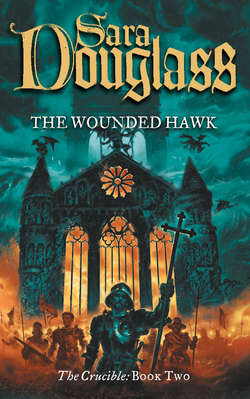Читать книгу The Wounded Hawk - Sara Douglass - Страница 8
III
ОглавлениеThe Feast of the Translation of SS Egidius and Priscus
In the first year of the reign of Richard II
(Thursday 1st September 1379)
Richard Thorseby, Prior General of the Dominican Order in England, sat at his desk in the dark heart of Blackfriars in London, slowly turning a letter over and over in his hand. His eyes were unfocussed, his sharp-angled face devoid of expression, and his equally sharp mind fixed on a memory of the previous Lent rather than on the contents of the letter …
The Dominican friary in the northern English city of Lincoln. The Lady Margaret Rivers, tearfully confessing that Brother Thomas Neville was the father of the bastard child in her belly. Neville himself, his behaviour, dress and conduct advertising to the world his blatant abuse of every one of his vows. And John of Gaunt, Duke of Lancaster, humiliating Thorseby and allowing Neville to escape Dominican discipline.
In the months since, Thorseby had never forgotten his affront, nor had he relaxed from his intention of bringing Neville to Dominican justice. Indeed, what had once been intention had now become obsession. Thorseby would move heaven and earth, if need be, to bring Neville to penitent knees.
Or worse.
But how to do so? Lancaster and his son, Bolingbroke, were powerful men, and Neville enjoyed their full support. If the arch-heretic, John Wycliffe, could escape the Church’s justice through Lancaster’s protection, then there was little Thorseby could do about the less-heretical problem of Thomas Neville. (Thorseby’s personal sense of insult would sway no one to attack the Lancastrian faction on his behalf.) For a time, Thorseby had thought he might be able to use the long-ago deaths of Neville’s paramour, Alice, and her three daughters, to his advantage. Surely Alice had well-connected family who would be pleased to see Neville brought to account for her death? Even her cuckolded husband could be useful.
But Alice’s family and husband proved disappointing. They were all dead: her parents, her sister, and even her husband, who had succumbed to a wasting fever while on a diplomatic mission to Venice four years previously. The family who were left—distant cousins—simply did not care overmuch … and certainly didn’t care enough to take on Lancaster and Bolingbroke.
“I will see you humbled yet, Neville,” Thorseby murmured, then blinked, and looked down at the letter in his hands.
It had arrived an hour ago, and was a summons to Rome where there was to be an Advent convocation of the Dominican Prior Generals. Normally, such a summons would irritate Thorseby; travel through Europe in November and December was never the most pleasant of pastimes, especially when the Advent and Christmas season was so busy here in England. But now such travel would give Thorseby the perfect opportunity to meet with those who had known Neville in the months when he had apparently decided to abandon completely his Dominican vows.
Somewhere in Europe lay the evidence that would enable Thorseby to extract Neville from Lancaster’s protection. Someone must have seen something that would damn Neville for all time; witnesses to a foul heresy, perhaps.
If there was one thing that Thorseby had learned from his Inquisitor brothers, it was that disobedience never goes totally unnoticed and unremarked upon.
Thorseby very carefully refolded the letter and put it to one side. He paused, briefly drummed his fingers on the desk, then leaned forward, picked up a pen, and began to compose the first of several letters he would send out later that evening.
Whatever he’d said to Neville, neither Wycliffe nor his companions had any intention of travelling to Canterbury in the near future. Tired and, on Wycliffe’s and Tyler’s parts, saddened by their inadequate farewells to a woman both loved in different ways, they’d moved directly from Halstow Hall south to the port city of Rochester.
There, as arranged, they met with several other men—two craftsmen and another Lollard priest—in a quiet room in an inn.
“Well?” Wycliffe said as he entered the room.
“Ready,” said one of the craftsmen. He indicated a stack of bundled papers. “Several hundred, as you requested.”
“Show me.”
The craftsman took a single large sheet of thick paper from the top of one of the piles and handed it to Wycliffe. Tyler, Ball and Trueman crowded about him, trying to read over his shoulder.
Wycliffe relaxed, then smiled at the three men he’d come to meet. “Very good. Wat?”
Wat was already shrugging off his distinctive livery, changing into the clothes one of the craftsmen handed him. Within minutes, he’d lost all appearance of a hardened sergeant-at-arms (save for his face) and looked more the prosperous farmer.
“You have mules for these men?” Wycliffe said.
“Yes,” the priest replied.
“Good.” Wycliffe turned to Tyler, Trueman and Ball. “My friends. You shall have the most troublesome of days ahead of you. Be careful.”
Then he smiled, the expression lightening his normally harsh face. “Remember, when Adam delved, and Eve span—”
“Then,” Wat finished for him, “there were no gentlemen!”
All the men broke into laughter, and, with that laughter were the seeds of revolution watered.
